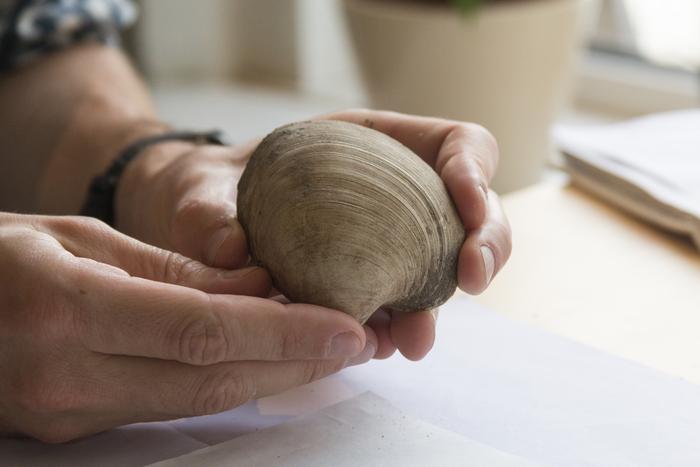Niels de Winter, affiliated with the Department of Earth Sciences at Vrije Universiteit Amsterdam and the AMGC research group at Vrije Universiteit Brussel, measured alongside colleagues from institutions such as the Institute for Natural Sciences in Brussels the chemical composition of fossil shells from Antwerp, Belgium. Those shells originate from molluscs such as oysters, cockles, and scallops found during the construction works of the Kieldrecht Lock. The molluscs lived lived during the Pliocene, approximately three million years ago, in the North Sea, which at that time also covered parts of Flanders and the Netherlands. The shells grew layer by layer, much like tree rings or fingernails, and stored very detailed information in their shell during their lifetime.

Credit: Doris Smudde
Niels de Winter, affiliated with the Department of Earth Sciences at Vrije Universiteit Amsterdam and the AMGC research group at Vrije Universiteit Brussel, measured alongside colleagues from institutions such as the Institute for Natural Sciences in Brussels the chemical composition of fossil shells from Antwerp, Belgium. Those shells originate from molluscs such as oysters, cockles, and scallops found during the construction works of the Kieldrecht Lock. The molluscs lived lived during the Pliocene, approximately three million years ago, in the North Sea, which at that time also covered parts of Flanders and the Netherlands. The shells grew layer by layer, much like tree rings or fingernails, and stored very detailed information in their shell during their lifetime.
Snapshot of the seasons
During the Pliocene, the Earth was on average 2.5 to 3 degrees Celsius warmer than it is now. In their study, published in Science Advances, the researchers took a ‘snapshot’ of the climate at that time to gain insight into the difference between the seasons in a warmer climate.
Rare heavy isotopes
They use the ‘clumped isotope analysis’ method. With this method, researchers study the composition of shells in even more detail. They do this by measuring the extent to which rare heavy isotopes of both oxygen and carbon occur in the same carbonate from which shells are built. These isotopes are more common in shells that formed in colder waters. As a result, the measurements can be used to reconstruct the temperature in which the shells were formed. This method is more accurate than conventional methods for temperature reconstructions because it does not rely on assumptions about the composition of the seawater in which the mollusks grew.
Summers heat up more than winter
The key insight is that summers warm much more than winters in a warmer climate such as the Pliocene. While winters became about 2.5 degrees warmer, temperatures during summer were about 4.3 degrees higher. The researchers see a similar result in models projecting future climate, which predict roughly the same amount of warming for the year 2100.
The study gives us a glimpse of what the climate in Europe will be like if we continue our current trend towards a warmer world. De Winter: “We will likely experience stronger temperature differences between summer and winter, and the chance of heatwaves during the summer will increase.”
The publication is available here:
Journal
Science Advances



